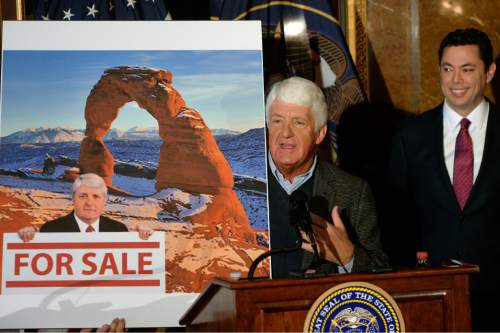This is an archived article that was published on sltrib.com in 2016, and information in the article may be outdated. It is provided only for personal research purposes and may not be reprinted.
On Feb. 17, I met with Rep. Rob Bishop at his Ogden office to discuss the Public Lands Initiative. I have found some grave discrepancies in what he told me during our meeting and what I have confirmed through independent sources. I'll address two examples here as illustrative of others contained in this bill.
On Economics: I began our conversation by presenting a case study done by Headwaters Economics on the economic impacts of the Grand Staircase Escalante National Monument in Kane and Garfield Counties. The data collected from 1996 to 2008 shows positive economic gains for those counties, including the substantial growth of jobs, real personal income and real per-capita income. My point in reviewing this study with Rep. Bishop was to point out that stronger protections for the PLI-proposed Bears Ears NCA, or even a national monument designation, would not only provide the stewardship that the tribes and conservation groups have been calling for, but it would also be a boon to the local economy — the "certainty" Bishop is striving for.
Bishop was quick to dismiss the study as "crap" because it was "counting St. George" in Washington County.
I wanted to verify whether or not this was true, so I contacted Headwaters Economics directly. I simply asked if anyone on staff could confirm or deny that their study of the monument did, in fact, include the city of St. George, thereby skewing the numbers and giving the appearance that the monument is more beneficial to the local economy than it really is.
I heard back from two people at Headwaters, including the executive director. He told me that during a hearing, Bishop "criticized [Headwaters] for not including St. George." He went on to say that he told Bishop that Headwaters "only looked at Kane and Garfield counties" because "including Washington County would have greatly skewed the numbers."
On Air Quality Standards:
Bishop said, "They've complained about our air quality standards. Our air quality standards are the status quo. We got the language from one of the environmental groups that are now attacking it as bad language, but it was their damn language in the first place."
The environmental groups did maintain that a wilderness designation would not automatically make the area a Class I airshed, as the Clean Air Act leaves that decision up to a state legislature. The Wilderness Society wrote the following to the counties participating in the PLI process: "Wilderness designation will not result in the establishment of Class I areas under the Clean Air Act."
However, that language is a far cry from nullifying the state Legislature's legal ability to ever classify those airsheds as Class I in the future, which is exactly what Bishop's PLI does. In Section 110, the PLI states, "The wilderness areas designated under section 101 shall not be designated as Class I airsheds under the Clean Air Act." Similar language for other designations will be found in Sections 204 (e), 303 (h), 501 (i), 704 (h), and 803 (d).
With this language, the PLI assures that all lands in question will remain, at best, a Class II airshed in perpetuity. That means that the drilling, mining, extracting, tar sands development, etc. (and their subsequent pollutions) that the PLI allows can proceed right up to the borders of a pristine wilderness area or other equally precious landscape- come what may. This language straight from the PLI does indeed paint a very different picture from what any self-respecting environmentalist would ever propose.
Disinformation has been spread far and wide regarding Rep. Bishop's PLI draft. Hopefully, people will begin to note these discrepancies and pledge to delve deep into the issue at hand, inform themselves, and make their own decisions. Unfortunately, it has become all too clear that candor is not something we should expect from those lobbying this bill.
The fact that the author of the bill, Rep. Bishop himself, felt the need to misrepresent the facts to one of his own constituents in order to justify the contents of his legislation speaks volumes to the dubiousness of its merits.
Josh Boling is a teacher in Logan.



